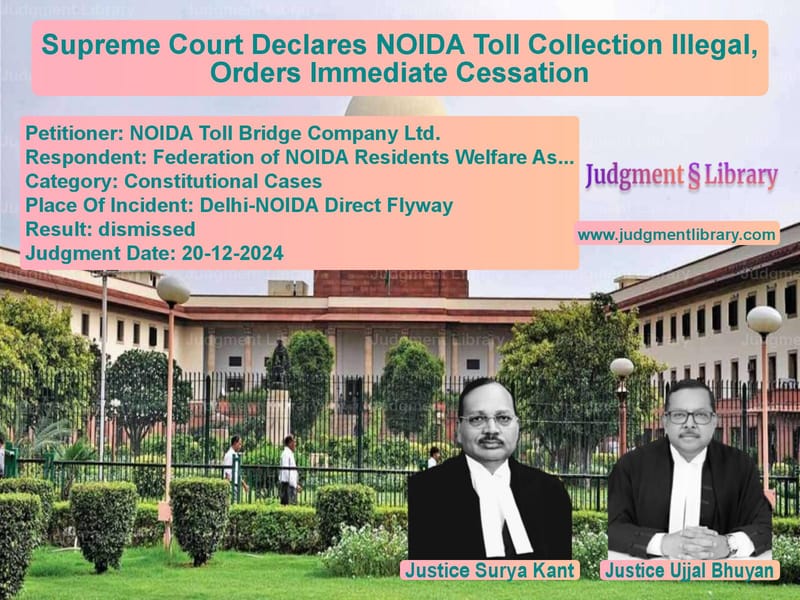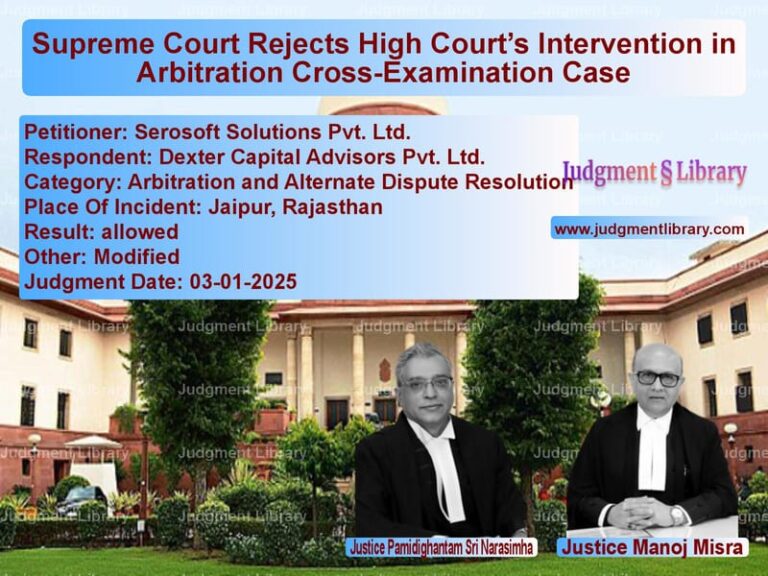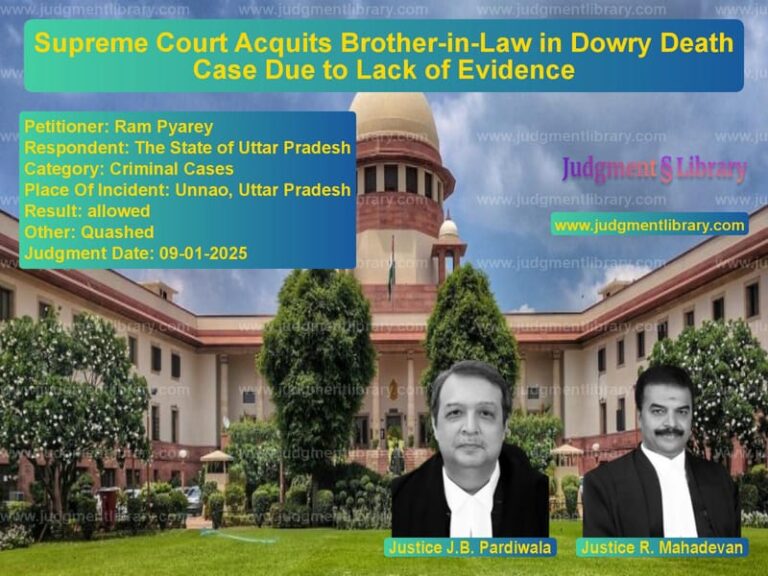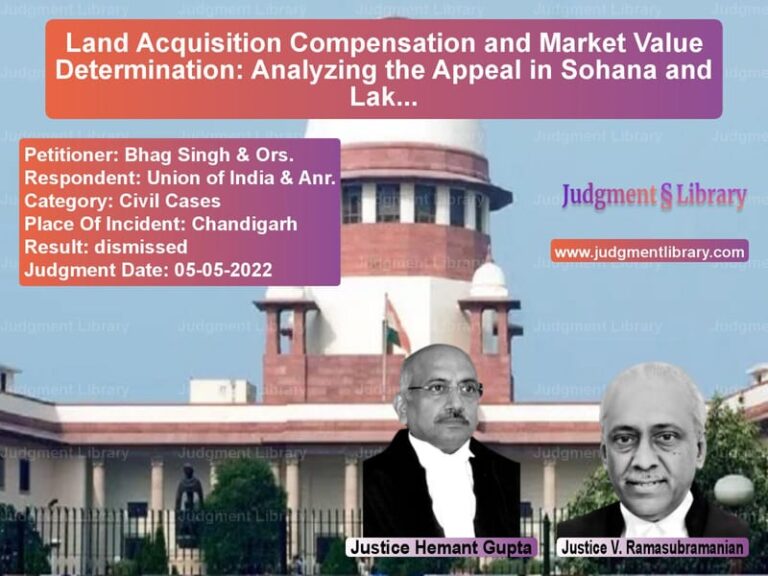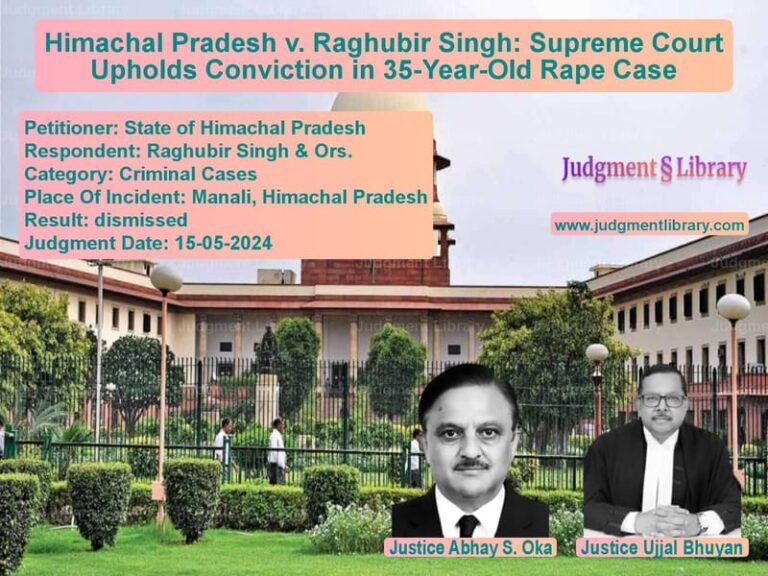Supreme Court Declares NOIDA Toll Collection Illegal, Orders Immediate Cessation
The Supreme Court of India has delivered a landmark ruling in NOIDA Toll Bridge Company Ltd. vs. Federation of NOIDA Residents Welfare Association, putting an end to the prolonged toll collection on the Delhi-NOIDA Direct Flyway (DND Flyway). The bench, comprising Surya Kant and Ujjal Bhuyan, upheld the Allahabad High Court’s decision, declaring the continued levy of tolls unconstitutional and an undue burden on commuters. The ruling has far-reaching implications for public-private partnership (PPP) infrastructure projects in India.
Background of the Case
The case centered around the legality of the toll collected by the NOIDA Toll Bridge Company Limited (NTBCL) on the DND Flyway, a bridge constructed to enhance connectivity between Delhi and NOIDA. The project, developed under a Build-Operate-Own-Transfer (BOOT) model, was governed by a Concession Agreement signed on November 12, 1997, between NTBCL, the New Okhla Industrial Development Authority (NOIDA), and Infrastructure Leasing & Financial Services Ltd. (IL&FS).
The High Court Ruling
In its 2016 judgment, the Allahabad High Court held that the concession period had become perpetual in nature, violating constitutional principles. The court specifically ruled that:
- Article 13 and 14 of the Concession Agreement were illegal.
- NTBCL must immediately stop charging user fees from commuters.
- The selection of NTBCL for the project violated Article 14 of the Constitution, as no competitive bidding process was followed.
Key Legal Issues
- Was the Writ Petition filed in public interest maintainable?
- Did the absence of a tender process violate public procurement norms?
- Was the power to levy and collect tolls lawfully delegated to NTBCL?
- Did Article 14 of the Concession Agreement lead to an indefinite toll collection period?
- Had NTBCL already recovered its total project costs and profits?
Arguments Presented
Petitioner’s (NTBCL) Arguments
The appellant, represented by Senior Advocate Dr. Abhishek Manu Singhvi, argued:
- The High Court erred in entertaining a public interest litigation (PIL) against a contractual agreement.
- There was no delay in NTBCL recovering its investments.
- The Concession Agreement was approved by multiple authorities, including the World Bank and Asian Development Bank.
- Without the concession framework, private investment in infrastructure would be discouraged.
- The fee collection was governed by the NOIDA (Levy of Infrastructure Fee) Regulations, 1998, which were legally valid.
Respondent’s (Federation of NOIDA Residents Welfare Association) Arguments
The residents’ association, represented by Senior Advocate Parthiv Goswami, contended:
- The toll collection was arbitrary and unjustified, as NTBCL had already recovered the project cost.
- The Concession Agreement was biased in favor of NTBCL, allowing indefinite toll collection.
- There was no competitive bidding, violating public procurement principles.
- NTBCL inflated its project cost to justify continued toll collection.
Supreme Court’s Analysis
1. Validity of the Writ Petition
The Court held that the PIL was maintainable as the toll collection affected millions of commuters. The Court emphasized:
“Public infrastructure developed under PPP models must be subject to judicial scrutiny to ensure fairness and prevent abuse of public resources.”
2. Competitive Bidding Requirement
The Court ruled that NOIDA failed to conduct a fair selection process. It observed:
“The absence of a transparent tendering process raises serious concerns about favoritism and financial propriety.”
3. Delegation of Power to Levy Fees
The Court found that NOIDA exceeded its authority by delegating toll collection rights to NTBCL:
“Only a statutory authority can levy tolls. NOIDA had no power to grant this right to a private entity.”
4. Perpetual Nature of Toll Collection
The Court criticized Article 14 of the Concession Agreement for creating an endless financial obligation on commuters:
“The indefinite nature of toll collection, based on an ever-increasing ‘Total Project Cost,’ is unfair and contrary to public interest.”
5. Recovery of Project Costs
The Court relied on a Comptroller and Auditor General (CAG) report that confirmed NTBCL had already recovered the project costs:
“The project costs and substantial profits have been recovered; there is no justification for continued toll collection.”
Final Verdict
The Supreme Court dismissed NTBCL’s appeal and upheld the High Court’s ruling. The key directives were:
- Immediate cessation of toll collection on the DND Flyway.
- Severing of Article 14 of the Concession Agreement.
- NOIDA may seek damages from NTBCL for excess toll collected.
- Future PPP projects must include clear, enforceable sunset clauses.
Impact of the Judgment
This ruling has major implications:
- Relief for commuters: Millions of daily travelers between Delhi and NOIDA will now travel toll-free.
- PPP project scrutiny: Ensures fairness and prevents exploitation of infrastructure agreements.
- Investor confidence: Reinforces the importance of transparent concession agreements.
By ensuring that the public is not burdened with perpetual tolls, this judgment safeguards constitutional principles and promotes responsible governance.
Petitioner Name: NOIDA Toll Bridge Company Ltd..Respondent Name: Federation of NOIDA Residents Welfare Association.Judgment By: Justice Surya Kant, Justice Ujjal Bhuyan.Place Of Incident: Delhi-NOIDA Direct Flyway.Judgment Date: 20-12-2024.
Don’t miss out on the full details! Download the complete judgment in PDF format below and gain valuable insights instantly!
Download Judgment: noida-toll-bridge-co-vs-federation-of-noida-supreme-court-of-india-judgment-dated-20-12-2024.pdf
Directly Download Judgment: Directly download this Judgment
See all petitions in Public Interest Litigation
See all petitions in Fundamental Rights
See all petitions in Constitution Interpretation
See all petitions in Legislative Powers
See all petitions in Judgment by Surya Kant
See all petitions in Judgment by Ujjal Bhuyan
See all petitions in dismissed
See all petitions in supreme court of India judgments December 2024
See all petitions in 2024 judgments
See all posts in Constitutional Cases Category
See all allowed petitions in Constitutional Cases Category
See all Dismissed petitions in Constitutional Cases Category
See all partially allowed petitions in Constitutional Cases Category

